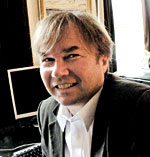Interview: Christopher Winn
Like Schotts Miscellany, Christopher Winn's 'I Never Knew That About The English' adds greatly to the pleasure of our island story


Exquisite houses, the beauty of Nature, and how to get the most from your life, straight to your inbox.
You are now subscribed
Your newsletter sign-up was successful
The panelled booth of a Victorian tea room off Piccadilly seems an appropriate place to meet Christopher Winn. For this learned, unassuming and thoroughly English author has added I Never Knew That About London to his best-selling series, which includes England, Wales, Scotland and Ireland. These charming compendiums, the latest of which is I Never Knew That About The English (with the Irish and Scots versions due next year) have proved a resounding success, with more than 300,000 sales already.
Like Schott’s Original Miscellany or George Courtauld’s Pocket Book of Patriotism, Mr Winn has struck a chord through his use of facts and anecdotes, which add greatly to the pleasure of our island story. What does seem unlikely is the author himself, who confesses to having hated school he was too much of a rebel and expresses genuine surprise at the fame that, at the age of 51, has come to him. ‘I thought people knew all the stories I have to tell, but in fact they don’t. I hope I’ve created works that are a delight to dip into.’ It’s not just the facts, but that Mr Winn has chosen them with his wonderful eye for the interesting and odd that makes his books so special. He is fascinated by churches, gardens and gardeners, pioneers, martyrs, sportsmen and actors, as well as a fine sprinkling of popular culture.
Mr Winn was brought up in the Surrey Hills. He was sent to Cranleigh School and Dean Close in Cheltenham. ‘I wasn’t a good schoolboy, which was nothing to do with the schools. I just didn’t like being told wha to do and was much happier exploring by myself.’ As a child, he picnicked in the Surrey countryside with views across the Weald to the South Downs. When his father took a job looking after the conference centre at Cowley Manor in Gloucestershire, Mr Winn was in his element. ‘We would host fêtes with swans on the lake and throw ourselves into village life. We really did feel like squires of the manor, and I felt it was my destiny to inherit a country pile.’
In 1976, the family moved to Lambeth Palace, where Mr Winn’s father became bursar to Dr Coggan and Robert Runcie, successive Archbishops of Canterbury. ‘My bedroom was in the Cranmer Tower, where he wrote the Book of Common Prayer.’ Instead of university, Mr Winn spent six happy years helping his father and receiving important guests at Lambeth Palace. ‘I loved butling,’ he says, and one imagines the conversations he had with such guests as Lady Thatcher and Princess Michael of Kent, whom he describes as ‘ravishingly good looking and not at all pushy’. It was here that Mr Winn refined his enthusiasm for collecting trivia, setting quizzes for newspapers and television, and later working with such well-known personalities as Sir Terry Wogan and Jonathan Ross.
He admits to choosing the home he shares in West London with his elegant Japanese wife, Mai the illustrator of the delicate drawings in his books because of its proximity to the BBC studios. However, above all the people he has met, the revered late country-house historian, cineaste and Country Life contributor Hugh Montgomery-Massingberd stands out. Through him, Mr Winn got to know Mai as, together with actor Moray Watson, they toured the country houses of Britain with Massing-berd’s Ancestral Voices, his play about James Lees-Milne. ‘We were treated as guests and lived in Hugh’s reflected glory,’ says Mr Winn, whose journey with the play took him to such great houses as Petworth, Burghley, Bowood and Glamis.
It may be fairly assumed that together they captured their host’s hearts and castles. ‘There is still a lot of English-ness out there. You can’t define it. Fair play is a human value, and if you leave people to their own devices, they are very decent.’ Of his discoveries in his latest book, one has touched him more than most. It was to find that there are in England some 31 ‘Thankful Villages’, where all the men returned from the front in the First World War. How may we know them, I ask? ‘They have no war memorial,’ comes the reply, obvious perhaps, but patiently given. If Mr Winn has a lament, it is that history is so important, and yet it isn’t properly taught today in schools. His absorbing books, full of inspiration, are more than doing their bit to redress that.
‘I Never Knew That About The English’ by Christopher Winn is published by Ebury Press at £9.99
Exquisite houses, the beauty of Nature, and how to get the most from your life, straight to your inbox.
Country Life is unlike any other magazine: the only glossy weekly on the newsstand and the only magazine that has been guest-edited by His Majesty The King not once, but twice. It is a celebration of modern rural life and all its diverse joys and pleasures — that was first published in Queen Victoria's Diamond Jubilee year. Our eclectic mixture of witty and informative content — from the most up-to-date property news and commentary and a coveted glimpse inside some of the UK's best houses and gardens, to gardening, the arts and interior design, written by experts in their field — still cannot be found in print or online, anywhere else.
